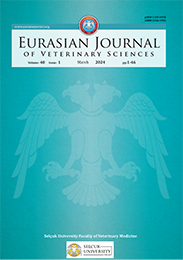| 2004, Volume 20, Number 1, Page(s) 061-069 |
| [ Summary (Turkish) ] [ PDF ] [ Similar Articles ] |
| Effects of Pasteurization and Various Scalding Temperatures on the Quality of Urfa Cheese |
| Mustafa Ardıç, Mustafa Nizamiloğlu |
| Selçuk Üniversitesi Veteriner Fakültesi, Besin Hijyeni ve Teknolojisi Anabilim Dalı, KONYA |
| Keywords: Urfa Cheese, Pasteurization, Scalding, Quality |
| Downloaded:1566 - Viewed: 2432 |
|
The study was made to determine effects ol pasteurization to milk and various scalding temperatures applied to curd on the quality characteristics of Urfa cheese. For this purpose two different curds were produced using raw and pasteurized cow's milk. And then each group was treated with different scalding process; not scalding, scalding at 65 °C for 5 minutes and scalding at 75 °C for 5 minutes. Thus six different group cheeses were produced. Scalding process applied to curd reduced fat content in dry matter of cheeses produced from raw milk considerably on the first day. It was determined that every temperatures in scalding process applied to curd which was produced from pasteurized milk caused decreasing moisture content on the 1th, 15th, 60th and 90th days and increasing protein ratio on the 15th and 90th days. Scalding at 75 °C caused decreasing salt content in dry matter on ihe first day. Scalding process reduced Staph, aures count on the 30th and 60th days, mould and yeast count on the 90th day of curds produced from raw milk and yeast-mould on the 1st day, co-liform bacteria on the 15th, 30th and 60th days of curds produced from pasteurized milk. It was determined that heating process at 75 ºC to curd produced from raw milk had important effect on apperance on the 30th day. It was concluded that use of pasteurized milk and scalding treatment of curd at 75 ºC should be used in order to protect public health and slan-dardize production of Urfa cheese.
|
| [ Summary (Turkish) ] [ PDF ] [ Similar Articles ] |




